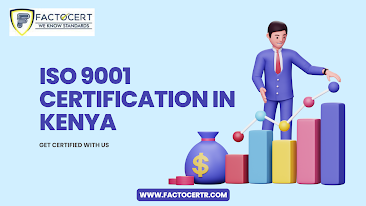Why is it crucial for the pharmaceutical sector to have quality management systems like GMP or ISO Certification?
Introduction:
A GMP Certification in Kenya, the method guarantees that goods are consistently manufactured and monitored following quality standards. It is intended to reduce any production-related risks associated with pharmaceuticals that cannot be avoided through testing the finished product.
GMP Certification in Kenya is intended to prevent errors from happening. GMP Certification in Kenya implementation is an investment in high-quality pharmaceuticals. In addition to benefiting the pharmaceutical industry and healthcare professionals, this will enhance the health of the individual patient and the community.
Why does the pharmaceutical sector need a (QMS)GMP Certification in Kenya?
A quality management system (QMS) motivates businesses to keep current to enhance operations. It makes it simpler to find locations where you need to make changes. As technologies evolve, you may need to upgrade your system to make it function more efficiently and do more.
You can use it to automatically track updates to SOPs, guidelines, goods, and production procedures. The program makes it simple to send changes via the approval process and guarantees that they are implemented.
5 Key Elements of GMP Certification in Kenya:
Products:
The finest quality primary materials (or raw ingredients) must be employed to make a medical device or other pertinent solution. According to GMP regulations, all products must adhere to a particular master formula without any variations during production.
People:
Employing qualified individuals will promote GMP compliance as well. These employees will also benefit from instruction in correct equipment handling, documentation, and sanitation. Although investing in training is costly, it can have a huge impact on quality control. Each team member plays a unique duty and must adhere to tight manufacturing requirements.
Processes:
The strictest guidelines must be followed for all production operations, including their documentation. Documentation is crucial since auditors frequently check laboratories and other facilities for uniformity and quality. Manufacturers can go one step further by providing all team members with copies of the written documentation of the full manufacturing process.
Procedures:
Procedures and processes are mutually exclusive. A set of instructions required to carry out a process is known as a procedure (to generate a specific result). Manufacturing processes are closely examined during audits. Manufacturers who use outdated technology in any method run the danger of being fined for noncompliance.
Premises:
All buildings, labs, and equipment must be kept in good condition to ensure safe, sterile, and efficient manufacturing conditions. This covers appropriate cleaning and storage and any other actions that can be performed to produce consistent outcomes, reduce the likelihood of equipment failure, and guarantee prompt repairs.
Fundamentals of GMP Certification:
Before we wrap up this article, think about the following summary of GMP's core values:
Standard Operating Procedures creation (SOPs).
SOPs and job instructions must be followed.
All processes and procedures must be documented.
Confirmation of the SOPs' effectiveness.
Creating and utilizing functional systems.
Increasing worker competencies.
Upkeep of facilities, machinery, and systems.
Preventing contamination by maintaining high standards of cleanliness.
Putting quality first in the process of design, development, and production.
What advantages come with GMP Certification in Kenya?
- Ensure that reps choose amazing creations.
- Establish the manufacturers and management problems.
- Adherence to regulations and laws.
- Boost reputation and credibility.
- Lower the chance of product quality and safety failing.
- Boosts consumer trust in your products
How to Obtain GMP Certification in Kenya?
Before applying for a GMP Certification in Kenya, you must first obtain a GMP Certification. This can be assisted by a certified GMP Consultant business like Factocert.com. An alternative would be to look into conferences or online training courses that offer GMP certification. check out for more information
Contact us at contact@factocert.com or through our website if you need assistance implementing this GMP Certification management system or if you have questions about how to achieve GMP Certification in Kenya so that our consulting professionals can give you a successful project plan.
Conclusion:
A GMP Certification in Kenya (QMS) can provide an organized approach. It can help in identifying quality issues, eliminating ineffective procedures, and closing performance gaps. The purpose of the GMP Certification in Kenya system is to enable third-party certification by providing a formal structure of tools and processes. Organizations must attain a high level of compliance through self-evaluations of standard operating procedures, comprehensive facility inspections or audits, and documentation pertaining to GMP Certification in Kenya.

.png)


Comments
Post a Comment